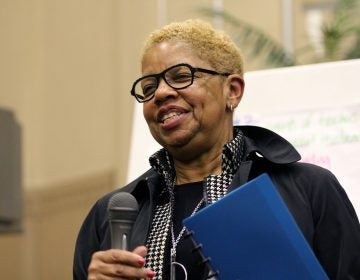Roxborough neighbors unite at National Night Out
“America’s Night Out” isn’t just for adults. Seated behind a black laptop at Gorgas Park in Roxborough, Simon Brown of NY Life Insurance is taking pictures, asking questions and cracking kids up.
He’s making child identification packets as a part of National Night Out, and having a good time doing so. In between the photographs, fingerprints, security questions, and the distribution of the final product – laminated identification cards – he cracks jokes.
“Let’s check that criminal history,” he says to the boys and girls queued in front of the park pavilion.
During a quick break – he’s already completed about 20 ID kits; one every seven minutes – he explains his philosophy.
“At NY Life, we all do a certain amount of charity. I feel that the most important thing for me to do is to do something that I can connect to with my heart. When I’m here, the last one is as fun as the first one. Keep em’ coming,” he said.
Last night, Roxborough was one of more than 15,000 communities nationwide participating in the 28th annual National Night Out. Held in Gorgas Park, the event brought together community members, law enforcement officials, local activists, and the child ID team sponsored by NY Life to raise awareness about crime prevention and encourage participation in anticrime efforts.
How it began
Sponsored by the National Association of Town Watch (NATW), National Night Out (NNO) – “America’s Night Out Against Crime” – began in 1984 at the behest of Wynnewood resident and current NATW executive director and National Project Coordinator, Matt Peskin.
“Although it was introduced in Wynnewood, it was never a local thing,” said Peskin in regard to NNO’s origins. He said that while no specific event or events triggered its implementation, “it seemed like the time was right.”
He continued, observing that at the time, “people were retreating, hiding behind locked doors. 99-percent of us are law-abiding citizens. It was a symbolic way of showing how easy it was to combat crime.”
Using pre-existing networks established by NATW, Peskin used newsletters and mailings to help get the word out to the 400 communities that participated in its inaugural year. Since then, the organization has grown to more than 37 million participants and welcomes the opportunities afforded by new media.
In the last few years, Peskin has noticed a dramatic change. Citing the popularity of NNO’s Facebook page, he notes that communities have been – in his words, “egging each other on” – to new levels of participation.
“In ’84, it was all mail, and now, boom, at the push of a button, it’s really taking things to the next level,” Peskin said.
Peskin admits that while police departments were reluctant to embrace its concepts at the outset – “it was a hard sell, initially” –the early support of key figures, including then-Philadelphia District Attorney Ed Rendell, helped establish the event.
“(He) understood the concept and supported the initial efforts.” From there, Peskin adds, “it was a ripple effect.”
‘When people stop caring, that’s when a neighborhood goes.’
Representing the Philadelphia Police Department in Roxborough was Captain John Cerrone of the 5th District. Introduced by the district’s spokesman Charlie Kline, Cerrone observed that National Night out has become a major event throughout the country, and that “the Philadelphia Police Department takes pride in being a part of this.”
Cerrone continued on a personal note, saying “I’m so happy to see so many of you at what has become a worthwhile night. Crime is pervasive, so it’s up to people like you who care. When people stop caring, that’s when a neighborhood goes. We strive to keep this neighborhood as nice as it is”
When asked about the role of NNO in terms of policing strategy, Cerrone spoke to its ideals, stating that “National Night Out is a show of symbolism about how people care, and about how they can work with the police department. Many of (the community) are tired of crime, but they can do the little things that are necessary to assist us in preventing it.”
Cerrone also touched upon the importance of law enforcement engaging the community. “Our success is predicated upon the cooperation of the community – we rely on the eyes and ears of the community. This neighborhood isn’t plagued with crime, largely because people are caring and are willing to intervene.”
Nurturing change in a community
It is this collaboration between community and police that is the essence of effective policing. Dr. Jerry Ratcliffe, Director of the Center for Security and Crime Science at Temple University, states that while community policing tends to have a negligible impact on crime reduction and few – if any –direct benefits, its success may lie in the indirect benefits afforded by ongoing communication.
“Events of this nature tend to be successful where the contact level (between community and police) is kept up,” says Ratcliffe. “One night a year won’t do much, but it can encourage the community to raise awareness and to nurture a change in the behavior of young people, particularly young males.”
Ralph Taylor, Professor of Criminal Justice at Temple University, suggests that it is difficult to gauge fully the effectiveness of events like National Night Out. Citing a paucity of funding and the sophisticated requirements of attendant research, he said, “Can it work? Yes. Do we know that it can work? Yes. Do we fully understand the situations that make it more or less effective? No.”
Taylor states that National Night Out’s value lies in its symbolic functions – “showing that there are a large number of residents who can take back the streets” – and positive changes in police attitudes. Lastly, he adds that, “very simply, people who are involved really like it, because it allows them to network and get to know other folks.”
“It’s not so much crime prevention as it is networking for community efficacy – where community residents look out for each other – and in a way that’s long-lasting.”
Residents on patrol
One resident looking out for his neighbors was Scott Abercrombie, who was in attendance last night along with his wife Sarah and 5-month old son Charlie. Abercrombie began conducting patrols in his Roxborough neighborhood after a spate of burglaries a few years ago.
“Since then it’s been pretty calm,” he was quick to point out.
Abercrombie, who along with at least three other regular participants – and a handful of others who assist when they can – maintains a Yahoo page group and organizes a patrol schedule. “It’s difficult sometimes,” he said, in regard to personnel commitments, “but we have a handful of dedicated members.”
Abercrombie keeps a list of police contact information and whenever he comes across information, he gets in touch.
“It’s been pretty successful,” he concluded.
When asked whether or not this was his first time at National Night Out, Abercrombie said simply, “We always come to this.”
WHYY is your source for fact-based, in-depth journalism and information. As a nonprofit organization, we rely on financial support from readers like you. Please give today.




